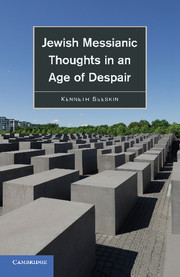80 results
16 - Can There Be a Positive Theology?
- from Part V - Analytic Philosophy and Theology
-
-
- Book:
- The Cambridge Companion to Jewish Theology
- Published online:
- 03 December 2020
- Print publication:
- 17 December 2020, pp 375-391
-
- Chapter
- Export citation
Chapter 4 - What the Guide of the Perplexed Is Really About
-
-
- Book:
- Interpreting Maimonides
- Published online:
- 03 December 2018
- Print publication:
- 06 December 2018, pp 65-84
-
- Chapter
- Export citation
Contributors
-
-
- Book:
- The Cambridge Dictionary of Philosophy
- Published online:
- 05 August 2015
- Print publication:
- 27 April 2015, pp ix-xxx
-
- Chapter
- Export citation
Chapter 6 - Monotheism at bay: the Gods of Maimonides and Spinoza
-
-
- Book:
- Spinoza and Medieval Jewish Philosophy
- Published online:
- 05 December 2014
- Print publication:
- 04 December 2014, pp 108-127
-
- Chapter
- Export citation
Contributors
-
-
- Book:
- Spinoza and Medieval Jewish Philosophy
- Published online:
- 05 December 2014
- Print publication:
- 04 December 2014, pp vii-vii
-
- Chapter
- Export citation
Kenneth Hart Green. Leo Strauss and the Rediscovery of Maimonides. Chicago and London: University of Chicago Press, 2013. 224 pp.
-
- Journal:
- AJS Review / Volume 38 / Issue 1 / April 2014
- Published online by Cambridge University Press:
- 02 May 2014, pp. 194-196
- Print publication:
- April 2014
-
- Article
- Export citation
Chapter 6 - Maimonides’ appropriation of Aristotle's ethics
-
-
- Book:
- The Reception of Aristotle's Ethics
- Published online:
- 05 February 2013
- Print publication:
- 13 December 2012, pp 107-124
-
- Chapter
- Export citation
Chapter 6 - Maimonides’ appropriation of Aristotle's ethics
-
-
- Book:
- The Reception of Aristotle's Ethics
- Published online:
- 05 February 2013
- Print publication:
- 13 December 2012, pp 107-124
-
- Chapter
- Export citation
Notes on contributors
-
-
- Book:
- The Reception of Aristotle's Ethics
- Published online:
- 05 February 2013
- Print publication:
- 13 December 2012, pp vii-viii
-
- Chapter
- Export citation
21 - Reason as a Paradigm in Jewish Philosophy
- from V - Issues in Modern Jewish Philosophy
-
-
- Book:
- The Cambridge History of Jewish Philosophy
- Published online:
- 28 September 2012
- Print publication:
- 07 May 2012, pp 635-662
-
- Chapter
- Export citation
Copyright page
-
- Book:
- Jewish Messianic Thoughts in an Age of Despair
- Published online:
- 05 March 2012
- Print publication:
- 06 February 2012, pp iv-iv
-
- Chapter
- Export citation
Introduction
-
- Book:
- Jewish Messianic Thoughts in an Age of Despair
- Published online:
- 05 March 2012
- Print publication:
- 06 February 2012, pp 1-2
-
- Chapter
- Export citation
Contents
-
- Book:
- Jewish Messianic Thoughts in an Age of Despair
- Published online:
- 05 March 2012
- Print publication:
- 06 February 2012, pp vii-viii
-
- Chapter
- Export citation
2 - Maimonides and the Idea of a Deflationary Messiah
-
- Book:
- Jewish Messianic Thoughts in an Age of Despair
- Published online:
- 05 March 2012
- Print publication:
- 06 February 2012, pp 27-50
-
- Chapter
- Export citation
1 - Messianism and Mythology
-
- Book:
- Jewish Messianic Thoughts in an Age of Despair
- Published online:
- 05 March 2012
- Print publication:
- 06 February 2012, pp 3-26
-
- Chapter
- Export citation
3 - Internalism: The Messiah Within
-
- Book:
- Jewish Messianic Thoughts in an Age of Despair
- Published online:
- 05 March 2012
- Print publication:
- 06 February 2012, pp 51-78
-
- Chapter
- Export citation
Bibliography
-
- Book:
- Jewish Messianic Thoughts in an Age of Despair
- Published online:
- 05 March 2012
- Print publication:
- 06 February 2012, pp 207-216
-
- Chapter
- Export citation

Jewish Messianic Thoughts in an Age of Despair
-
- Published online:
- 05 March 2012
- Print publication:
- 06 February 2012
Jewish Messianic Thoughts in an Age of Despair - Half title page
-
- Book:
- Jewish Messianic Thoughts in an Age of Despair
- Published online:
- 05 March 2012
- Print publication:
- 06 February 2012, pp i-ii
-
- Chapter
- Export citation
6 - History and Irrationality
-
- Book:
- Jewish Messianic Thoughts in an Age of Despair
- Published online:
- 05 March 2012
- Print publication:
- 06 February 2012, pp 139-171
-
- Chapter
- Export citation



